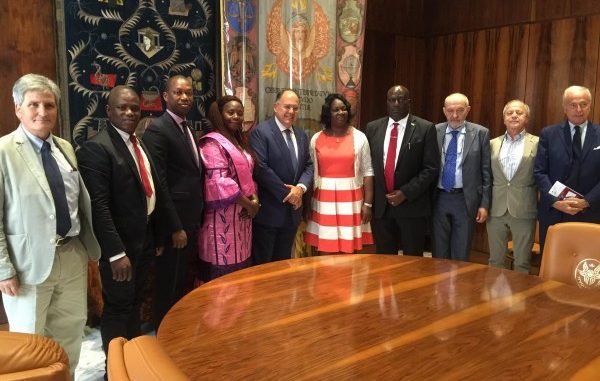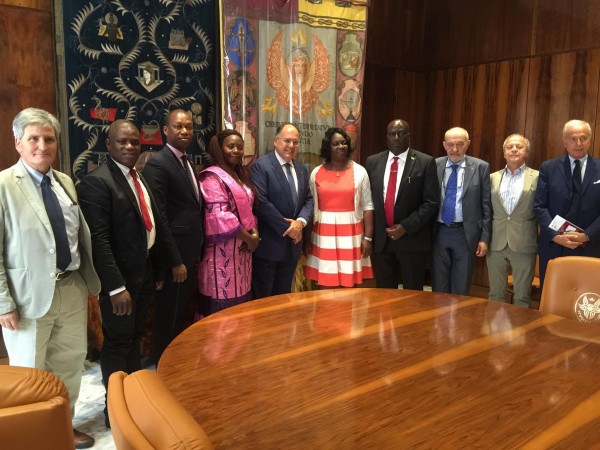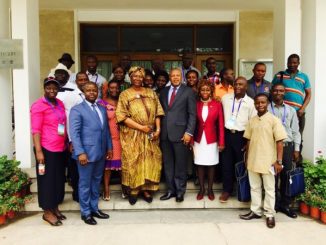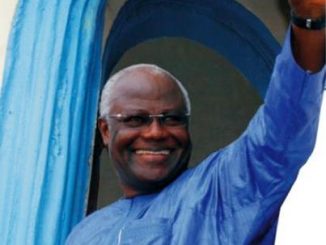
By Umaru S. Jah, Information Attaché — Germany
The Deputy Minister of Health and Sanitation 1, Mrs. Madina Rahman has completed a weeklong working visit to the Republic of Italy, commencing on Sunday 10th July to Monday 18th July 2016.
The Minister’s visit was aimed at among other things, exploring possible areas of bilateral cooperation between Sierra Leone and Italy, with a view to further strengthen the country’s health sector.
In separate but similar meetings held in Milan and Rome respectively, Mrs. Rahman had fruitful discussions with key health professionals in medical institutions and universities, as well as the Italian Minister of health, Mrs. Beatrice Lorenzin.
Issues relating to the establishment of a national blood transfusion centre, enhancing the skills and knowledge of health professionals, including but not limited to technical assistance to overhaul the entire health system in the country were discussed.
Given an overview of the health infrastructure in the country, Mrs. Rahman said Sierra Leone’s health system has been severely disrupted despite its existing weakness before the Ebola outbreak. But the emergence of the Ebola epidemic has worsened the situation thus resulting to the country’s health system becoming more fragile.
According to Mrs Rahman, the government is now faced with numerous challenges to improve the health sector. In response to those challenges, she said her President has recently launched the second phase of the post Ebola recovery programme, prioritising key sectors to achieve short and immediate term goals. Among them, she said, is the health sector. She disclosed the 12 months period set aside to save the lives of five thousand children and six hundred women, ensuring the healthcare of Ebola survivors and maintaining resilience of not only Ebola but other infectious diseases across the country as well.
Other programmes and activities related to the improvement of surveillance, research and strengthening efforts to prevent emerging infectious disease are currently on going. The government through the ministry of health has also introduced postgraduate programmes at the Sierra Leone medical school to further ensure a sophisticated workforce of health professionals in the country.
She added that achieving those set goals required not only the political will but also effective collaboration to improve basic health care services through partnership and technical innovations to revitalize the health sector.
The Minister singled out the national blood transfusion centre, as the first pilot project should the Italians consider her requests made so far. She believes that introducing a national blood transfusion centre would solve the problem leading to an average of 46% maternal deaths in the country due to haemorrhage. It will also ensure accessibility to safe blood for all patients across the country to avoid inappropriate transfusions.
Responses from all the meetings held, including that with the Italian Minister of Health Mrs. Lorenzin, remain positive. Mrs. Lorenzin has already registered her government’s willingness to continue with their on going assistance projects in Sierra Leone particularly in the health sector.
She re-echoed her country’s commitment during the recent G-7 summit held in Berlin, Germany, where Italy vowed to render assistance to many countries including Sierra Leone.
Mrs. Lorenzin assured that her Ministry would be holding technical meetings to further establish full cooperation with Sierra Leone and work towards the national blood transfusion centre, as well as healthcare training programmes. She promised to engage the Italian Embassy in Abidjan as well as other stakeholders with a view to develop a memorandum of understanding to trigger the way forward.
The Minster of welfare, Don Gallera in Lombardia, the northern region of Italy, also expressed willingness to assist Sierra Leone in capacity building through advanced training and health related research programmes. He has also, on behalf of his region, requested a project proposal from Mrs Rahman to enable them fast track the said programmes.
Medical institutions and professionals equally made similar promises and have agreed to design a training scheme for health professionals to further strengthen the post graduate capacity introduced at the Sierra Leone Medical School.
Sierra Leone’s Ambassador to the Federal Republic of Germany also accredited to Italy and Austria, H. E. Jongopie S. Stevens, Presidential adviser on health, Madam Yabome Sesay and Information Attaché, Umaru S. Jah, at the Sierra Leone Embassy in Berlin, accompanied the Minister.




